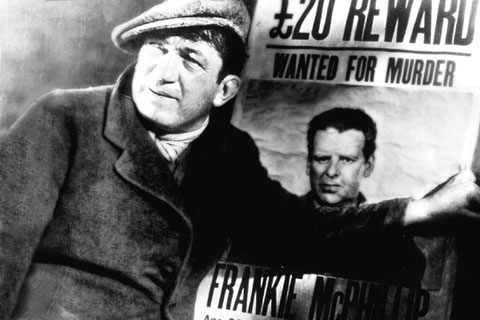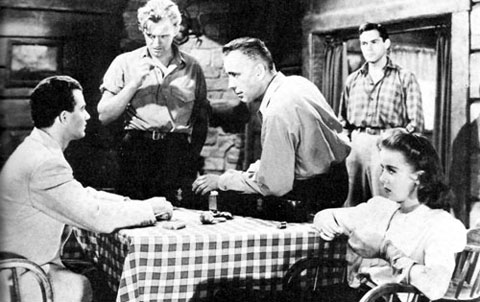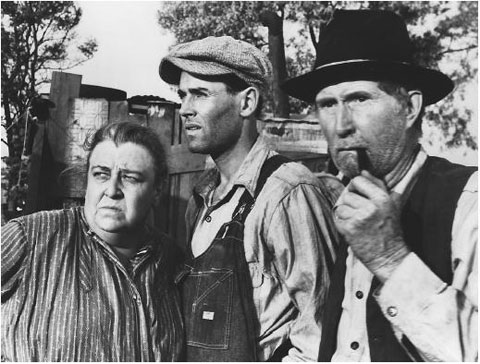ARCHIVES: The crisis of American filmmaking & cultural life (Part One)
A presentation by WSWS arts editor David Walsh

Tom Cruise as paraplegic Vietvet Ron Kovic, in Oliver Stone’s Born on the 4th of July, one of the best films ever made on that conflict. Too bad Cruise learned nothing from the character he interpreted. —Eds
By David Walsh (16 March 2010)
The following is an edited version of a presentation delivered by WSWS arts editor David Walsh in New York City and the Detroit area. (The second, and concluding, part of the talk ran on Wednesday, March 17, 2010).
When one considers the state of filmmaking, and art in general, one’s first response is, or ought to be, in my view, a profound sense of dissatisfaction. The spectator, or reader, or viewer, currently experiences a troubling lack of depth, texture, and social and psychological complexity. In short, there is an absence of the world, largely.
Certainly the world that great numbers of people know and experience on a daily basis: the world of work, or lack of work, the vast and complicated series of everyday social relationships, the startling changes in life in recent decades, the enormous inequalities and iniquities, the slipping into the social abyss of so many, the struggle to keep one’s head above water that characterizes the lives of tens of millions in this country, billions worldwide… and the emotional conditions, the drama, tragedy and comedy associated with all that.
Telling the truth is difficult, as George Eliot and Tolstoy both noted, but contemporary art and film, in our view, are failing badly in telling important truths, the truths that are vital to people.
No doubt there is a great deal of ideological and political, and even moral, confusion in this country—we aren’t mesmerized by that and struggle to overcome it on a daily basis—but one must say that the failure of film and novels and plays, in the first place, to hold up a mirror to the country adequately in recent decades, to expose American society’s crimes and injustices, to show the population its own shortcomings, is a factor in the confusion.
We’ve made the point before: the Russian novelists of the 19th century, by their combined efforts, contributed to the discrediting of official society and its eventual downfall. What should we say in this regard, by and large, about contemporary American filmmakers and writers? Have they exerted themselves, made enormous sacrifices in the struggle to clarify and demystify reality, the nature of American society itself? Have they helped the population understand its predicament? The answer is obvious, I think.
Representing the world more fully and richly is not a matter of mere surface details, or of passive recording. When we speak about “the presence of the world” in art, we mean its real presence, which includes centrally its social and historical character. As the Austrian novelist Robert Musil (The Man Without Qualities) commented, creative effort involves not mere description, but an interpretation of life.
At present we lack serious artistic interpretation influenced by the most advanced understanding of reality. The emergence of modern art and culture was inextricably bound up with the growth of Marxism and the socialist workers movement. The decline in the influence of genuine Marxism—not academic leftism, postmodernism, the Frankfurt School, and so forth—has had a serious, harmful impact on art and culture.
A seriousness about showing life in art needs to be revived, for the sake of society and for the sake of art, and that requires the re-emergence of a consciously socialist current in art and filmmaking. That is one of the central themes of this talk. We argue that only the active presence of a critique that takes society down to its bones and holds out an alternative can encourage artwork prepared to tell the whole truth.
Film remains a powerful medium. Some 1.5 billion movie tickets were sold in North America last year, representing about a third of the global total.
However, changing what needs to be changed, I believe much of this discussion applies to fiction and theater relatively directly, and to the other art forms more indirectly—no medium has truly blossomed, except in the formal or technological sense, in the recent period, in my view.
We are confronted with filmmaking’s shortcomings as an artistic and social fact. In terms of mainstream movies, for example, one only has to turn to the mostly dreadful list of Academy Award nominations for Best Picture this year. Up in the Air has possibilities, about a man who lives without relationships and accumulates air miles instead, but it is weakly worked out, in the end. There is Quentin Tarantino’s exercise in historical falsification and sadism, Inglourious Basterds, “fighting fascism with fascism,” as we noted on the WSWS. And Avatar, directed by James Cameron, which offers fascinating technology and little else.
There are several intelligent performances that received nominations—Colin Firth in A Single Man, Anna Kendrick for Up in the Air, and a number of others—but, in general, the nominations are a miserable showing.
And this in 2010! What have we lived through in the first ten years of the new century?
The US media widely acknowledges that the first decade of the 21st century was a disastrous one for American society. Time magazine’s headline read, “Goodbye (at Last) to the Decade from Hell.”
In brief: a hijacked national election, or perhaps two, a major terrorist attack, two criminal wars, vast Wall Street plundering and a massive crash. To what extent, directly or indirectly, have these developments found expression in movies which tens of millions of people affected by these events go to see? Is there a film or are there films that sum up the 2000s in a conscious and meaningful fashion? I’m open to suggestion, but I can’t think of one.
In fact, what sort of a picture of the world could you assemble from the various images generated by most Hollywood films of the past 10 years? Reality as seen through a narrow prism, of people without financial cares, obsessed with trivial concerns; these are dull films by and large, with the great drama of life missing (and the life of the upper-middle-class has not been seriously depicted either, for that matter).
American filmmaking has been able in the past to think more critically, to grasp the whole, or important portions of it—consider these films from the mid 1930s to the early 1940s, just a few of the many extraordinary works made at the time:
These are arguably the three greatest figures in the American cinema, Chaplin, Ford and Welles. All, at the time, considered to be figures of the Left.
The FBI viewed John Ford as some sort of a subversive. The Informer is a magnificent study of treachery in the political struggle, with an atmosphere worthy of Alfred Döblin’s Berlin Alexanderplatz. Grapes of Wrath, despite its occasional sentimental streak, conveys tremendous sympathy for the characters’ plight. This story of suffering and resistance in the Depression made Henry Fonda himself a deeply beloved figure. Is there any equivalent today?

Or is there anything resembling Chaplin’s persona? Or are there personalities as profoundly worked out, as passionately portrayed as Welles’s Kane?
Where is the writer or director or actor today who has become identified with the plight of wide layers of the population?
We don’t feel a trace of nostalgia. There is no golden age we’re seeking to recreate—but there were periods in American filmmaking and individual works that were seen as offering a deep, universal insight into social life. Do we have that today? Or anything near it? Again, the question, I think, answers itself.
Also, it must be said, audiences were more knowledgeable and demanded more. We have to be frank about this: too many mediocre or worse films receive a free pass. American audiences at this point, sadly, ask for and expect far too little. It’s certainly not the fault of the individual spectators, but it remains a problem. We receive email: you don’t like anything, you’re too critical, you shouldn’t expect so much …
We don’t agree. Of course, we make mistakes—one might overvalue a certain work, and undervalue another. However, if we are critical in our appraisals, it’s not our fault there are so many poor and inadequate works, to speak more plainly, so much rubbish. To tell the truth about the problems in a sharp fashion is part of the process of changing things. The population, along with economic and political resistance, needs to build up its powers of cultural resistance.
I would suggest some of the same general difficulties hold true in fiction, drama. Consider this:
Where are the comparable figures and novels? Where are the strong and telling images, the unforgettable characters? The authors, especially Dreiser and Fitzgerald, attempted to make broad, universal statements about American life. Where is the sense conveyed today of a historical period and of important popular moods, reality caught at a very high level, in fact, at the highest level?
If we turn for a moment to some of the films of the 1930s and early 1940s. This is not an exhaustive list, or a scholarly undertaking, but a sample of memorable works.
A good number of the movies come from Warner Bros., several are directed by Michael Curtiz, later joined by Raoul Walsh. Warners had James Cagney, Edward G. Robinson, Paul Muni. The films, many of whose very titles are suggestive, are characterized by lively, fierce and snappy dialogue, unsentimentality, realism of a sort—they offer a feeling of the decade. One could learn something about the country, the times, the population, by watching these films.
There are also films on the list by German émigré Fritz Lang and John Huston. Lang’s You Only Live Once and Fury—the latter about a lynching—are frightening films about injustice.

High Sierra, with Humphrey Bogart and Ida Lupino, one of the most expressive performers of the era, is a particular favorite. It conveys a definite sense of the Depression years, their harshness, including their psychic harshness, but also enormous tenderness and sensitivity that somehow survive, like flowers growing through cracks in rock.
Casablanca, Maltese Falcon, of course, are well-known films.
In the end, these movies and others can only be accounted for by the fact that Hollywood had a large left wing and also a politically aware European émigré constituency in the 1930s and 1940s. The Depression, the rise of fascism, and the example of the Russian Revolution had an enormous impact on the film community. It is a very contradictory phenomenon, with many tragic aspects, because of the role of the Stalinist Communist Party, but it remains a fact that when the anti-communist purges came, in the late 1940s and early 1950s, the authorities had to drive out, discredit or intimidate hundreds and hundreds of writers, directors, and actors.
The list of left-wingers in Hollywood included, as one work on the subject notes, “Lucille Ball, Katharine Hepburn, Olivia de Havilland, Rita Hayworth, Humphrey Bogart, Danny Kaye, Fredric March, Bette Davis, Lloyd Bridges, John Garfield, Anne Revere, Larry Parks, some of Hollywood’s highest-paid writers, and for that matter the wives of March and Gene Kelly along with Gregory Peck’s fiancée.” (Radical Hollywood: The Untold Story Behind America’s Favorite Movies, Paul Buhle and Dave Wagner) Also, Franchot Tone—then married to Joan Crawford—Jose Ferrer and apparently Ronald Reagan, all of whom were in or around the Communist Party periphery.
As I noted a few years ago: “One could add Sterling Hayden, who turned informer later on, then regretted it, Sylvia Sidney, Shelley Winters, Lauren Bacall, and many, many others. Melvyn Douglas and Frank Sinatra were also named by an FBI informant, along with Paul Muni, born in Ukraine and a veteran of Yiddish theater in New York, whose career was wrecked by the blacklist.” John Ford, as I mentioned, was under suspicion at one point, and Chaplin and Welles were effectively driven out of the country.
The influence of the émigrés—many of whom had been raised in major cities, and were exposed to European culture and politics, in which the socialist labor movement played a central role—was a factor in giving Hollywood films a more sophisticated content in the 1930s and 1940s.
We observed as long ago as 1996, in the International Workers Bulletin:
Let’s consider this list of postwar films:
A film such as William Wyler’s The Best Years of Our Lives, about returning World War II veterans and their discontents, dealt with experiences through which masses of people passed, the experiences of a generation. The title is ironic. The film takes an “unpatriotic,” realistic view of things. It is critical of the treatment of war veterans.
Or one could point to John Ford’s wartime film They Were Expendable (1945). The title refers to the US Navy’s attitude toward PT boats and their crews. Would anyone in mainstream Hollywood dare today to make a work critical of the military?
It is worth mentioning as well other wartime films such as Howard Hawks’s To Have and Have Not and Billy Wilder’s Double Indemnity (both from 1944), the latter a savage film about American lower-middle-class mores.
Or take some of the leading actors of the period. Simplification, caricature and emotional ‘rounding off’ were very much present, but, at their best, performers embodied something about the American personality, or personalities.
Take Edward G. Robinson and John Garfield, Jewish working class types, or working class intellectuals. Robinson, who met with Trotsky in Mexico, Garfield, a supporter of the Communist Party, essentially hounded to his death. James Cagney, born in the tough Yorkville section of Manhattan, anti-clerical and left-wing, at least until the authorities got to him.
Or Bogart, who grew out of the gangster parts in the late 1930s into something interesting in films such as High Sierra, Maltese Falcon, Casablanca, To Have and Have Not, Key Largo and others. In Casablanca and To Have and Have Not, in particular, he plays the pragmatic, efficient individualist, who initially rejects a political or social appeal, but, in the end, responds strongly to the plight of the oppressed, proves capable of solidarity and of democratic sensibilities.
Women’s roles expanded, and became more interesting, an important indicator of the relatively democratic, popular character of the films and filmmaking. A Barbara Stanwyck, for example, and numerous other tough working class or lower-middle-class girls, women—Joan Crawford, Jean Harlow, Ginger Rogers (aside from her dancing pictures): prepared to go to nearly any lengths to survive. The pre-Production Code films are even more explicit. Stanwyck, the former Ruby Stevens from Flatbush in Brooklyn, who worked as a wrapper in a department store…
Women who are intelligent, quick-witted, no pushovers, like the population itself: Bette Davis, Carole Lombard, Mary Astor, Greta Garbo, Marlene Dietrich, etc. In the 1940s, Lana Turner, Gene Tierney, Lauren Bacall, Joan Bennett, Veronica Lake, Ann Sheridan, and many others.
Compare these personalities to the present state of things. There’s a George Clooney, for example, a talented performer. His characters are clever, but don’t take themselves too seriously, ready to improvise and roll with the punches, if necessary. Capable of showing a darker, tougher side. But his persona is far less defined so far, in social terms. Among female performers, there are even fewer figures who have been given the opportunity to represent something substantial. There are enormously talented actors, that’s not the issue at all.

The opposite today of a Henry Fonda—in You Only Live Once, Young Mr. Lincoln and Grapes of Wrath—might be the unfortunate Tom Hanks. Considerable effort has been made to turn him into an “American Everyman,” in Saving Private Ryan and elsewhere. In Forrest Gump, a terrible film, he was meant to represent that Everyman as an idiot. Hanks has lent himself to efforts intended to strengthen myths about America, about the Second World War, about the “Greatest Generation,” and all that. None of that, however, has won him spontaneous public affection.
Numerous titles on that list of postwar films are suggestive of nightmares and delirium, ‘whirlpool,’ ‘caught,’ evil, nighttime, haunted… Several factors come into play—in the first place, the horrors of the Second World War and the Holocaust. But, as time passes, by 1948, let’s say, there is also the pressing matter of the reality of postwar America, which is revealing itself. One thinks of such films as Lady from Shanghai, Key Largo, Force of Evil, for example. An important new theme emerges: the powerful presence in postwar society of profiteers and criminals, including criminals in business suits.
Contrary to the illusions spread by the Communist Party and its periphery, the postwar did not mean the expansion of the New Deal, a flowering of democracy. This conception was bound up with entirely false conception of the war itself, which was not a war for democracy, although millions went to fight fascism, but a war between great power blocs, an imperialist war. The Stalinists ignored the brutality of the Allied bombings of German cities, applauded the incineration of Hiroshima and Nagasaki. They and those around them were utterly unprepared for the Cold War, the anticommunist witch-hunt and the purges, with disastrous consequences.
If one turns to the films of the 1950s and 1960s:
Indeed, in the 1950s certain ‘classical directors,’ Hitchcock, Ford, Hawks and Raoul Walsh, along with Anthony Mann and others, did some of their best work. And there were new voices, such as Douglas Sirk and Robert Aldrich. The films later in the decade, referred to in the slide, indicate a degree of disappointment, disillusionment with the promise of postwar America. Also, of course, with the collapse of the blacklist and the dissipation of the worst anticommunist hysteria, certain things could now be said.
The 1960s witnessed the collapse of studio filmmaking and the emergence of independents, some of whom are or become identified with the radical wave of the latter part of the decade and the early 1970s.
The early part of the 1970s, connected to the anti-establishment mood among masses of youth in particular, produced some films that ‘got’ certain situations and realities, that still attempted to make wide-ranging comments about American life. Of course, one thinks of Roman Polanski’s Chinatown. The Polish émigré helped create a scathing indictment of American big business and politics. Francis Ford Coppola gave us The Godfather, which argued that in America crime is business and business crime.
The most interesting group of films, in my view, may be Robert Altman’s McCabe and Mrs. Miller, California Split, The Long Goodbye, Thieves Like Us and Nashville. The latter, even if it is confused, makes an effort to link politics, celebrity and business in America.
Later in the decade there is Coppola’s Apocalypse Now, which, despite its occasional absurdities, is a remarkable film, expressing something of the horror and revulsion of a generation against the crimes committed in Vietnam by American imperialism. As we commented when it was re-released in 2001, an atmosphere of menace prevails throughout. We wrote, “One has an uneasy feeling that every time a group of Americans forms, violence will erupt.” Coppola’s ambitious film is an indictment of colonialism and its catastrophic consequences.
It seems worth noting, however, that the socially critical films of the 1970s, as valuable as some of them were and remain, generally lacked something present in earlier left-wing American filmmaking, with all its contradictions: a substantial interest in and the presence of the working class, or wide layers of the population, and their lives and problems in general. There is also a noticeable lack of interest in the great historical events of the 20th century. These limitations speak to the nature of the radicalization of the time and all the complex questions it left untouched.
In the 1970s too, Mel Brooks and Woody Allen made some of their best films. Sidney Lumet as well. Hal Ashby, Terrence Malick and Michael Cimino arrived with interesting, if flawed, works.
In the 1980s, in the face of the Reagan administration’s attacks on the population, carried out with the collaboration of the Democrats, and a sharp turn to the right in the American elite, the films that stand out are those that resisted the generally reactionary tide:
Warren Beatty’s Reds, about John Reed and the Russian Revolution, Woody Allen’s Crimes and Misdemeanors, on the ruthless selfishness of New York’s upper-middle class, Barry Levinson’s Rain Man, a criticism of the prevailing worship of greed, Michael Cimino’s Heaven’s Gate, a view of bitter class struggle in the 1890s in Wyoming, Oliver Stone’s Wall Street, about the criminal element rising to the top in American financial circles. Stone, to his credit, also made important films about the Vietnam War, Platoon and Born on the Fourth of July. Later in the decade, Michael Moore made his first feature, Roger & Me, about the decline and fall of Flint, Michigan.
There were numerous serious or well-intentioned efforts, including Edward Zwick’s Glory and John Sayles’s Matewan, but one must say: given the character of the assault on the population begun by Carter and undertaken vigorously by Reagan and the first Bush, the cinematic and artistic response overall was very weak and limited. By and large, the population was not clarified, whereas in Britain, in the work of Mike Leigh, Ken Loach, Stephen Frears and numerous others, there was a more concerted and conscious response to Thatcher, although one would not want to idealize the situation there either.
DAVID WALSH is WSWS.ORG‘s senior arts, culture and film critic.
To be continued
_______________________________________________________________________________
¶
ADVERT PRO NOBIS
IF YOU CAN’T SEND A DONATION, NO MATTER HOW SMALL, AND YOU THINK THIS PUBLICATION IS WORTH SUPPORTING, AT LEAST HELP THE GREANVILLE POST EXPAND ITS INFLUENCE BY MENTIONING IT TO YOUR FRIENDS VIA TWEET OR OTHER SOCIAL NETWORKS! We are in a battle of communications with entrenched enemies that won’t stop until this world is destroyed and our remaining democratic rights stamped out. Only mass education and mobilization can stop this process.
It’s really up to you. Do your part while you can. •••
Donating? Use PayPal via the button below.
THANK YOU.
____________________________________________________________________________________________________














